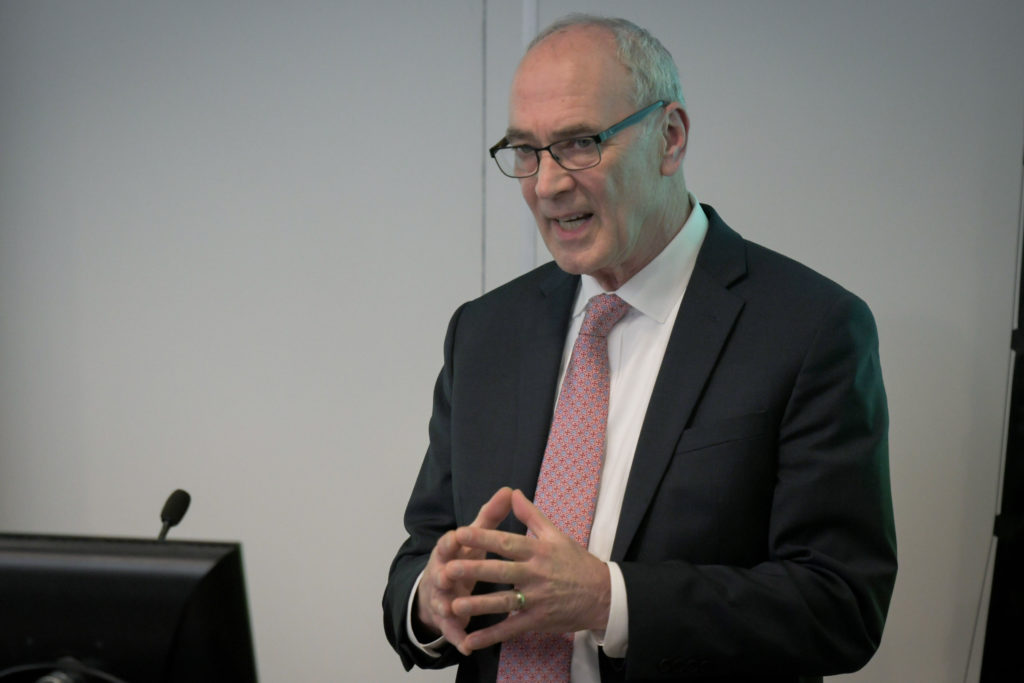The amount of international research funding the University receives has tripled over the past five years.
The University spent about $4.8 million on research funded by international sources in fiscal year 2018 – about three times the amount expended in fiscal year 2013, officials said. Faculty said increasing international research partnerships allows the University to maintain connections abroad and expand its global footprint.
Robert Miller, the vice president for research, said the University has been tracking information about research funding from international sources for more than 20 years. He said the most common sources of international research funding at GW are foreign universities and nonprofit organizations that work to “address issues on a global scale.”
Last fiscal year, 65 sponsored research projects were funded by international sources – an 86 percent increase from five years before, Miller said.
“Conducting international research projects is an important way to expand the University’s network, raise our research profile and diversify our funding sources,” Miller said in an email. “These projects give faculty and student researchers an opportunity to collaborate with new research partners and learn by applying their findings in different global conditions with unique challenges.”
Miller said there are a “number of issues” that require extra consideration when conducting research sponsored by an international organization including intellectual property, trademark, visas, cultural differences, travel and taxation.
He said each international sponsored research project is “essentially unique” with its own considerations depending on the country and the scope of work. But he said the potential extra work does not deter GW from undertaking international partnerships, and researchers work with foreign sponsors in the same ways that they work with domestic sponsors.
He declined to say how much funding the University has received and how many projects have been funded from international sources from fiscal year 2013 to fiscal year 2017.
The University’s international research website states that GW is “committed to enhancing the global reach of our research,” and the University will continue to expand its “international portfolio.”
The University currently partners with the São Paulo Research Foundation in Brazil, the Fondazione Inuit at the University of Rome in Italy and the American University of Armenia to provide funding for faculty-led research projects.
Officials said in 2015 that 8 percent of the University’s outside research includes an international component. Officials said the same year that they had hoped to increase that percentage by offering 20 grants, each worth $5,000, to researchers to travel internationally and meet with potential collaborators.
Leo Chalupa, a professor of pharmacology and physiology and the former vice president for research, said that while international funding often does not provide as much money as a federally funded grant, an international grant can boost a faculty member’s reputation as a global researcher, which could raise GW’s rankings.
University President Thomas LeBlanc has repeatedly said that he wants to bolster GW’s standing as a global research institution.
Chalupa said receiving international funding is “very competitive,” and while the University promotes global collaboration, it does not have a “sufficient global footprint” – an area oftentimes factored into national and international rankings.
“Any time any faculty member or administrator goes abroad and makes a connection with a colleague, that raises GW’s profile,” he said. “We’re still, for the most part, a regional university, and that has to change.”
Harald Griesshammer, an associate professor of physics, said he was funded by the German-based Deutsche Forschungsgemeinschaft to conduct research on theoretical nuclear physics in the country for one year between 2012 and 2013. He said the experience gave him “wonderful, fresh ideas” and the opportunity to collaborate with new researchers.
“Research without borders is the lifeblood of cutting-edge scientific discourse,” Griesshammer said in an email. “Intellectually, we benefit from such collaborations just as much as our international friends benefit from our expertise on particular issues.”
Griesshammer said a significant amount of the University’s nuclear physics research takes place in Germany. He said equipment travel for students and faculty is funded by the Department of Energy, and the experiments are funded mainly by German organizations.
Charles Garris, a professor of engineering, said he received partial funding from the Nippon Kokan KK Corporation in Japan for research on air conditioning about 10 years ago. He said he traveled to Japan several times, and Japanese colleagues worked with him at GW for more than a year.
Garris said international research collaboration makes the University more attractive to prospective students, both international and local, hoping to become involved in research. He said global collaboration promotes the exchange of ideas by creating opportunities for students from foreign universities to work on research in the United States.
“Sometimes, it can have various benefits, like students coming over and you can help them establish contact,” he said. “You can find out about new opportunities that you would never have been aware of if you didn’t collaborate with those people.”




